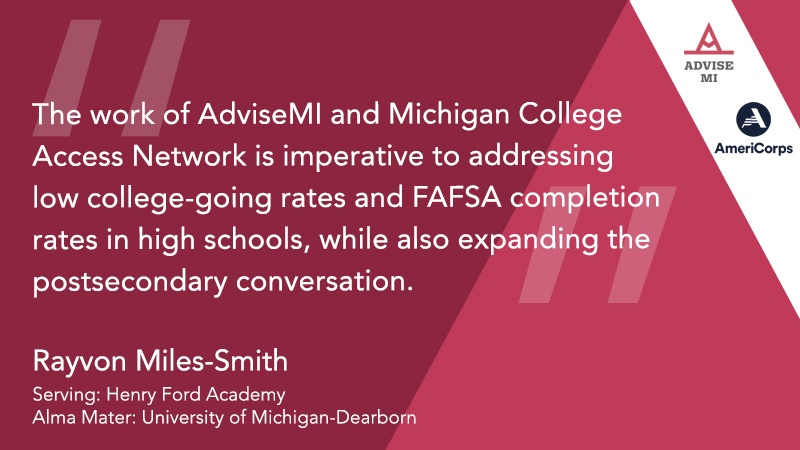
Everyone imagines their last year of high school as being the time of their life. Whether it’s hanging with friends at lunchtime, attending homecoming festivities, going to prom, or applying to colleges, senior year represents the ending of familiarity and the beginning of something new. However, the 2020-21 school year hasn’t lived up to what most seniors were hoping for when they began their high school journey four years ago.
As a first-year college adviser for AdviseMI, serving through the pandemic hasn’t come without its challenges. Across the board, students have experienced virtual learning fatigue, higher rates of academic disengagement, and social isolation. Nevertheless, assisting seniors in their pursuit of college enrollment has yielded a strongly intrinsic reward, perhaps even greater than it would during a normal school year.
The work of AdviseMI and Michigan College Access Network is imperative to addressing low college-going rates and FAFSA completion rates in high schools, while also expanding the postsecondary conversation to include certificate programs, in addition to two- and four-year degrees. According to a 2020 Georgetown University economic study, 70% of jobs in Michigan require formal postsecondary education. With the goal of increasing Michigan’s college completion rate to 60% over the next decade, AdviseMI plays an integral role in promoting the message that college is a necessity and it is for everyone.
The challenges of attending school during a pandemic have left many students without motivation and optimism to explore college options. Initially, I had difficulty contacting students and learning about their college enrollment progress. Emailing students didn’t bear many responses. I created Google surveys as an alternative to collect student data, which I use as a basis for our meetings. Even this method didn’t engage as many students as expected. Calling parents worked some of the time, but usually no one answered and a phone call was never returned. One of the ways I’ve worked successfully with students is through virtual advising sessions, which yielded much better results.
During Michigan College Month in October, I emailed the teachers of seniors and asked to create break-out rooms during their virtual class sessions. Since then, I’ve assisted dozens of students with their FAFSA and college applications, while also gaining the trust of many parents as a viable source of information. Typically, students and I work together via Google Meet for 30-45 minutes to apply for college together and investigate their program interests. Students usually share their screen during the application process. Afterward, we schedule a meeting to complete the FAFSA form together. Within two weeks, I send follow-up emails to go over next steps after being admitted to college.
In one of my first student meetings back in September, a student met with me and expressed a lack of desire to attend college. No one in their family has graduated. If college meant more virtual classes, it was out of the question. Just as AdviseMI has expanded the “postsecondary conversation,” I made sure to expand my role as a college adviser to include being a great listener.
Without attempting to persuade the student, I simply asked questions to gain an understanding of their interests. Of course, with some added encouragement, the student gradually accepted college as an option to consider for their future. After applying to college and FAFSA together, I met with the student to review their award letter. Upon review, the student had been fully awarded for the first year of college, without having to accept any loans.
Soon enough, this became the reality for other students who previously felt that college wasn’t for them. Graciously, I’ve received many emails from parents and students thanking me for being persistent and informative during each meeting. Thus far, nearly 84% of seniors have been accepted to college and almost 50% have completed FAFSA. I’m confident the numbers will increase as schools consider reopening in the spring. Despite the numbers being down compared to years prior, I’m satisfied students are being given a chance to change their lives through the pursuit of college completion.
Everyone imagines their last year of high school as being the time of their life. ... However, the 2020-21 school year hasn’t lived up to what most seniors were hoping for when they began their high school journey four years ago.